
It was a quieter year at the annual film festival in Park City, Utah, but there were still plenty of powerful, moving, and surprising films worth talking about.
The Tale
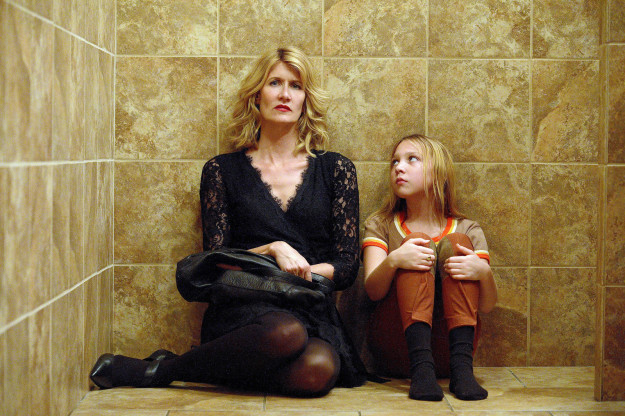
The most talked about film at the 2018 festival, hands down, was Jennifer Fox’s autobiographical drama about a woman reexamining her recollections of what she convinced herself was a consensual sexual relationship when she was just 13 years old. She gradually comes to realize that it was actually abuse. The Tale, which stars Laura Dern as a version of the director, is so relevant to the #MeToo moment that it’s startling to learn that Fox, a documentarian making her scripted debut, had been considering this project for years. Dern is as good as she’s ever been in the lead role, venturing into some dark emotional territory, but it’s the film’s flashbacks, in which 13-year-old Jenny is played by the painfully young Isabelle Nélisse (with an adult body double filling in during sex scenes), that will really test and devastate audiences. Fox fearlessly explores not just predatory behavior and the malleability of memory, but how these experiences can shape the rest of our lives, no matter what we openly acknowledge — defining what we think is normal, and influencing the people we become. —Alison Willmore
Distribution: The Tale has been purchased by HBO Films, and will premiere on the network sometime this year.
Courtesy of Sundance Institute
Eighth Grade
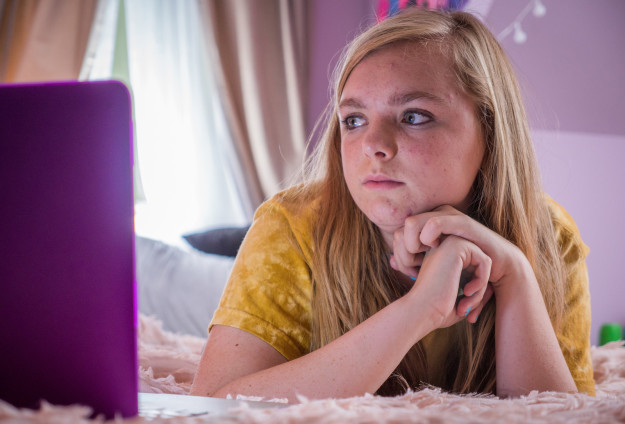
As a teenager, Bo Burnham built his comedy career by posting linguistically dexterous, vigorously brazen rap videos to his YouTube channel from his bedroom. So there was reason to expect Burnham’s feature film debut as a writer-director — about Kayla (Elsie Fisher), an eighth-grade girl who also posts videos to her YouTube channel from her bedroom — would take on a similarly skewed, voluble comic worldview. Instead, and much to the surprise and delight of Sundance audiences, Burnham reveals a deeply felt empathy for what it’s like to be a sweet, painfully quiet girl just trying to get through her last week of middle school. The film features some bursts of startling cringe comedy, like when Kayla suddenly blurts out to her crush that she has dirty pictures of herself on her phone. But Fisher (who voiced Agnes in the first two Despicable Me movies) always keeps us hooked into Kayla’s inner life without ever slipping into a kind of precocious maturity of polished child actors. And while Burnham roots her story in the signifiers of our current moment (late night Instagram k-holes, school shooting drills), mostly Eighth Grade captures the universally relatable small-yet-potent dramas of simply being 13, like showing up at a birthday pool party when you’re friends with no one, and learning to navigate attention — wanted and alarmingly not — from older teenagers. —Adam B. Vary
Distribution: A24 will release Eighth Grade at some point this year.
Courtesy of Sundance Institute
Sorry to Bother You
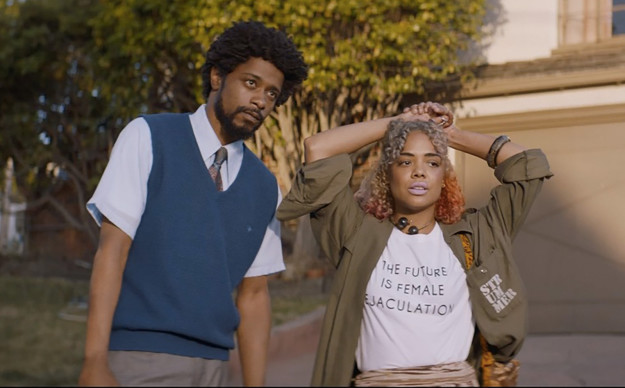
A Rainbow Brite whirlwind from the brain of hip-hop artist Boots Riley, Sorry to Bother You is a movie that will stay with you. That might be because of its stellar cast: Lakeith Stanfield, Tessa Thompson, Armie Hammer, Steven Yeun, Terry Crews, Kate Berlant — the list goes on. It might be because the film is positively dripping in the kind of style that can really energize a person. Or it might be that this is a movie built on a foundation of fantasy devices and surrealism that keeps the floor constantly moving underneath you the whole time you’re watching it. Or perhaps it’ll be the striking social commentary that’ll get you. But most likely, it’ll be all of the above. Never has a story about a group of telemarketers been so dynamic, and rarely have I been so excited to see how the rest of the world will react to a film. If this movie doesn’t develop a strong and devoted fanbase, I’ll eat my hat. — Alanna Bennett
Distribution: Annapurna Pictures bought Sorry to Bother You’s worldwide rights and will distribute it.
Courtesy of Sundance Institute
The Kindergarten Teacher
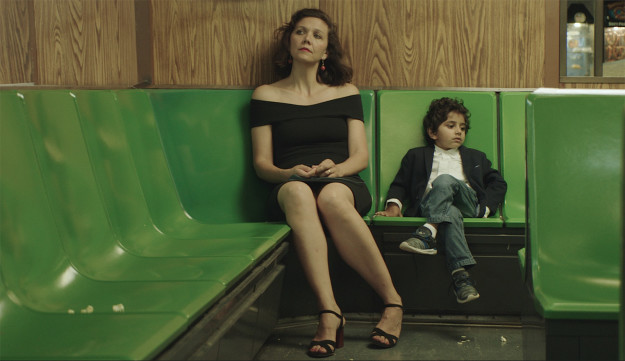
Writer-director Sara Colangelo’s remake of a 2014 Israeli drama of the same name is not, in any conventional sense, a horror film. But sometimes it sure feels that way, as you observe with dread the way the character of the title, the restless Lisa Spinelli (played by producer Maggie Gyllenhaal), channels her dissatisfaction with the conventionality of her Staten Island life into an obsession with a student she believes is a poetry prodigy. Jimmy (Parker Sevak) is sweet and not quite 6 years old, and he occasionally lets loose with some very advanced-sounding vocabulary, but The Kindergarten Teacher keeps us wondering whether he’s a child genius or a canvas onto which adults project greater meaning. Similarly, the film keeps us on a knife’s edge regarding Lisa’s motivations, and what combination of sincere and selfish is driving her to act out. Gyllenhaal keeps the character human while refusing to soften her increasingly outlandish behavior in a career-great performance. —A.W.
Distribution: The Kindergarten Teacher does not yet have theatrical distribution, though it really, really should.
Courtesy of Sundance Institute
Hereditary
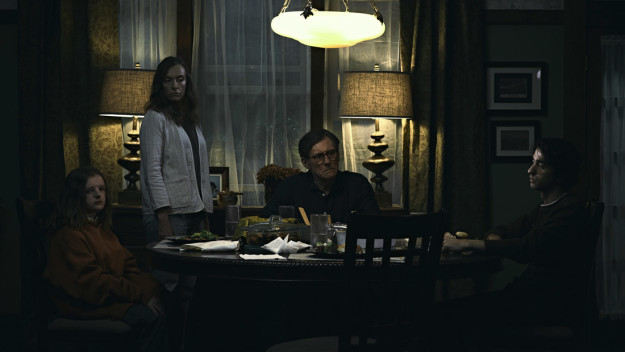
It’s tough to give an overview of the midnight movie that scared the collective pants off the festival this year. Director Ari Aster’s feature debut sidles so slyly up to its nightmarish premise that for long stretches all you know is that something is going slowly and terribly wrong for the family at its center — a family grieving for, or at least making gestures toward grieving for, its difficult, late matriarch. Annie Graham (Toni Collette), an artist, tries to hide herself in her work, while husband Steve (Gabriel Byrne) attempts to be supportive, son Peter (Alex Wolff) just wants to be a normal teenager, and dreamy daughter Charlie (Milly Shapiro) seems stuck between worlds. Before it all goes to hell, Hereditary works just as well as a drama about people trying to pretend the growing fractures between them aren’t there, and trying to will their dark history into the past. Every year, if we’re lucky, some title comes along that spans both the horror and arthouse genres, and Hereditary is set to be 2018’s answer to The Babadook, It Follows, and The Witch, combining awesomely disturbing imagery with unsettlingly thoughtful filmmaking. —A.W.
Distribution: Hereditary will open in theaters in wide release on June 8, from A24.
Courtesy of Sundance Institute
Won’t You Be My Neighbor
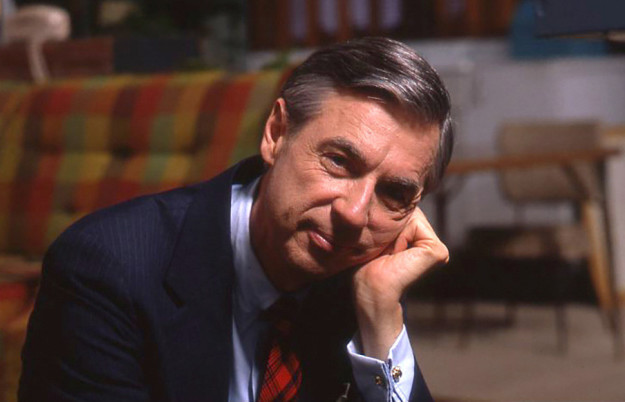
The late Fred Rogers was a miracle of a human being, an ordained minister and television evangelist for decency, kindness, and the power of imagination through his peerless PBS children’s series Mister Rogers’ Neighborhood, which aired from 1968 to 2001. In Won’t You Be My Neighbor, taken from the indelible song that Rogers sang at the start of every episode, director Morgan Neville (20 Feet From Stardom) chronicles the lifespan of the show and the man who made it possible, interviewing everyone from Rogers’ family to the crew members who worked on it for decades in its modest Pittsburgh studio. The result is as humane and profound as Rogers himself, a man who believed to his marrow in human goodness and the sanctity of childhood. But it’s no hagiography. What made Rogers so special also left him isolated in our increasingly crass world, and understanding better as an adult what drove him to become such a gentle giant for tens of millions of children is a soothing, if bittersweet, balm for the soul. —A.B.V.
Distribution: Won’t You Be My Neighbor will open in theaters on June 8, from Focus Features.
Courtesy of Sundance Institute
The Miseducation of Cameron Post
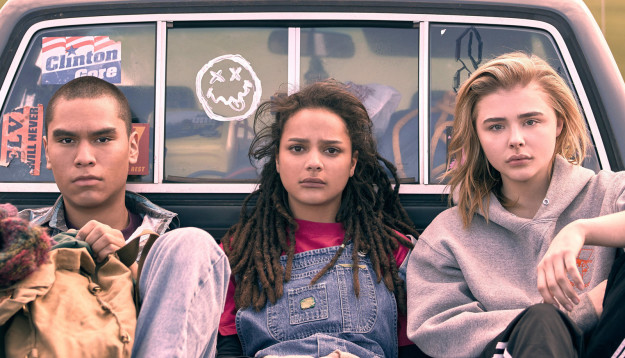
Adapted from the beloved YA novel of the same name, The Miseducation of Cameron Post aims to be what would happen if John Hughes met Todd Haynes and they focused their energies on a group of queer teens. And it mostly hits that mark, settling into a thoughtful rhythm in a challenging setting: a ’90s boarding school devoted to trying to turn queer kids straight. Miseducation is as interested in the stealth ways people find joy and intimacy in an oppressive world as they are in the oppression itself. There’s also a solid cast holding that down — Chloë Grace Moretz, Sasha Lane, Forrest Goodluck, John Gallagher Jr. are only a few of the names that make the movie sing. And with director-cowriter Desiree Akhavan steering the ship, the film finds moments of exuberance and humor that elevate it above after-school special and closer to a modern take on Hughes. — A.B.
Distribution: None yet.
Courtesy of Sundance Institute
Skate Kitchen
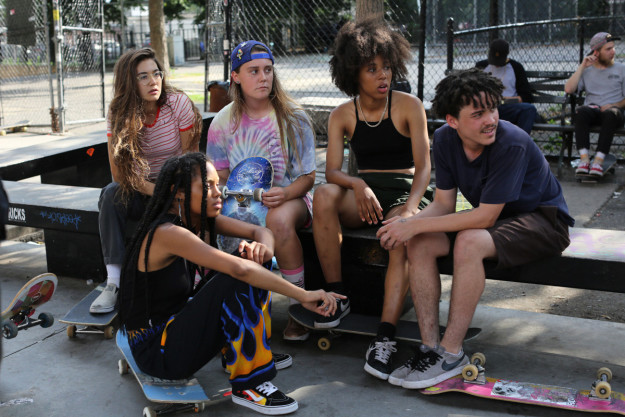
Two decades and change after Kids, Larry Clark and Harmony Korine’s button-pushing, cautionary tale about youngsters behaving very badly in New York City, filmmaker Crystal Moselle reclaims some of that unsupervised teen hangout territory on behalf of joyful liberation with this immensely pleasurable skateboarder drama. Moselle, whose first feature was the uneasy but unforgettable Lower East Side shut-ins doc The Wolfpack, returns to the same neighborhood for a film that’s scripted, but that, in terms of culture and cast, draws heavily from the real girl skater community of its title. Newcomer Rachelle Vinberg stars as Camille, a Long Island 18-year-old who makes her way from Instagram fan to gradual member of a gang of badass girls (played by fellow skaters Dede Lovelace, Nina Moran, Ajani Russell, and others) who carve out space for themselves in the city’s male-dominated parks and spots. Jaden Smith is the famous face who’s tucked in there as an elusive object of desire, but Skate Kitchen is really and unapologetically a film about girls — about identity, belonging, and the complicated rules of friendship. —A.W.
Distribution: None yet.
Courtesy of Sundance Institute
Private Life
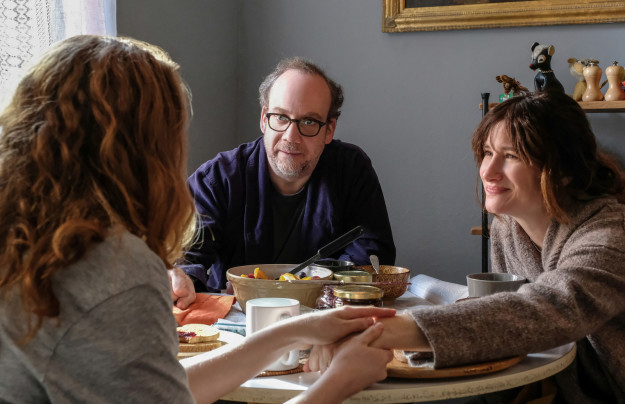
There are literally hundreds — thousands! — of movies about becoming a parent, but precious few focus on anything other than spontaneous pregnancy. So thank goodness for Private Life, which features Rachel (Kathryn Hahn) and Richard (Paul Giamatti), a New York couple in their forties who are grinding through the modern ways of starting a family that rarely if ever appear in a movie. They weather the expensive medical indignities of IVF and the emotional minefields of private adoption, and then, out of desperation, turn to their charmingly aimless twentysomething step-niece Sadie (Godless’ Kayli Carter) to be an egg donor. Writer-director Tamara Jenkins — whose last feature The Savages charmed Sundance 11 years ago — brings an unsparing eye to how infertility can run a marriage ragged, and how women of all ages endure the unyielding expectations placed on their bodies. (In the post-premiere Q&A, Jenkins joked that the Birdman-style pretentious title of her film would have been Private Life: The Biological Tyranny of the Female Condition.) But if Private Life sounds like a drag, it is anything but, for one big reason: Kathryn Hahn! I mean, Kathryn Hahn! KATHRYN HAHN! —A.B.V.
Distribution: Netflix will stream Private Life in 2018.
Courtesy of Sundance Institute
What They Had
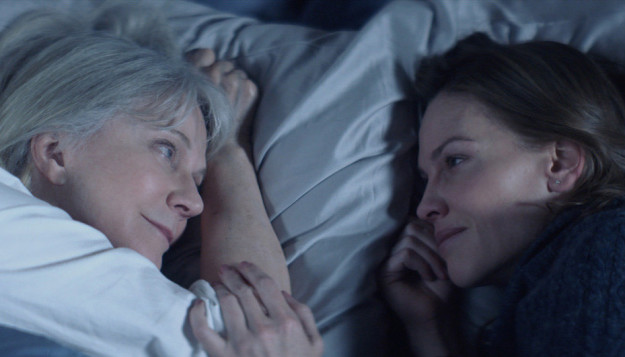
Family dramas about upwardly mobile white people brought together by a personal crisis has practically been a genre unto itself at Sundance for decades. But first-time writer-director Elizabeth Chomko imbues this one — about a family brought together after matriarch Ruth (Blythe Danner), with midstage Alzheimer’s, wanders away in her nightgown in a wintry Chicago night — with a charming lived-in specificity that feels immediately real. Michael Shannon gives great Michael Shannon as the son exasperated from trying to convince his irascible father, Burt (Robert Forster), to move Ruth into a full-time memory-care facility. And as Bridget, the sister stifled by her dull marriage, Hilary Swank makes clear she should be working a whole lot more than she does. Danner, meanwhile, has two moments when Ruth suddenly snaps into lucidity that walloped me flat. If Sundance is going to keep showcasing white-families-in-crisis movies, I hope they’re all as trenchantly funny and movingly well-observed as this one. —A.B.V.
Distribution: What They Had will open in theaters on March 16, from Bleecker Street.
Courtesy of Sundance Institute
Madeline’s Madeline
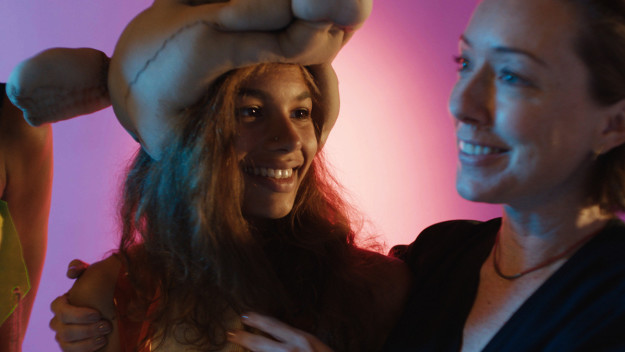
Madeline (Helena Howard) is a teenage girl with an incredible talent for theater and a mental illness for which she was recently hospitalized, and which she sometimes opts not to treat with the meds prescribed to her. The inside of her head is a dizzying, vivid place, and Madeline’s Madeline takes place almost entirely inside it, leaving the audience to parse out the slippery nature of reality as its main character perceives it. Josephine Decker’s film is a bold, brilliantly visualized portrait of a young woman caught between an overly protective mother (Miranda July) and a parasitic director (Molly Parker) whose attempts to work with her read more like attempts to appropriate portions of her life for the sake of art. But Madeline’s more than either woman can handle, maybe more than the world can, this force of nature whom Howard plays with such incandescence that it’s hard to believe she’s never acted onscreen before. —A.W.
Distribution: None yet.
Courtesy of Sundance Institute
Blindspotting
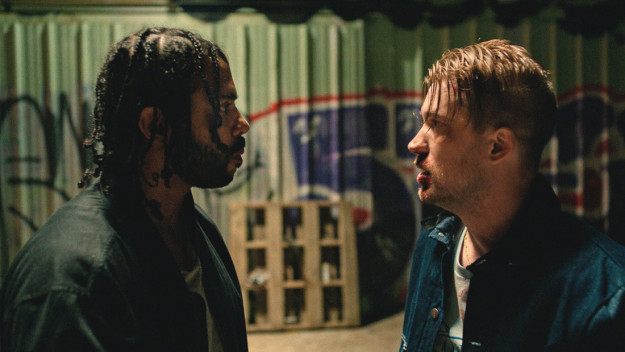
Blindspotting is the debut screenplay of Hamilton star Daveed Diggs and Rafael Casal, a complicated buddy film grounded in a gentrifying Oakland. It’s also the feature directing debut of Carlos López Estrada, and Casal’s first major film role. Given this many debuts — and that the film crackles with vitality from start to finish and experiments with verse in genuinely interesting ways — Blindspotting feels like the start of something very special. The film is centered on Diggs’ Collin, who works with Casal’s Miles as a mover and who’s adjusting to life after a stint in prison. Through deft uses of setting and character, the movie addresses race in a way that doesn’t just fall back on the same tropes we’ve become used to as moviegoers. Instead, it hashes out whiteness in a layered way. Blindspotting swings for the fences, a truly ambitious film and a showcase for a whole lot of talent. I’ll be interested to hear what conversations bubble up around it once the public gets ahold of it. And I’ll be interested to see what everyone involved goes on to do next. — A.B.
Distribution: Lionsgate will release Blindspotting later this year.
Courtesy of Sundance Institute
Monsters and Men
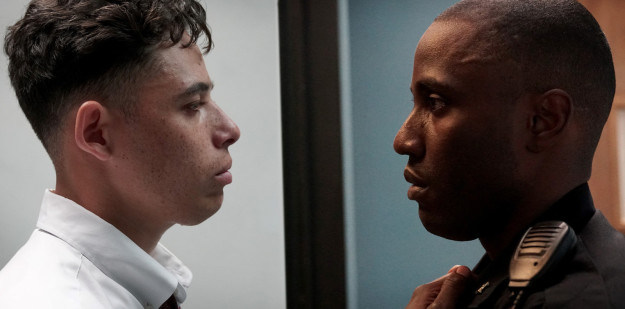
Like Blindspotting, the story of Monsters and Men springs from the shooting of an unarmed black man by a white police officer, and, oddly, they both feature Jasmine Cephas Jones (Peggy in the original Broadway cast of Hamilton) as the long-suffering mother of a main character’s child. But unlike the brashly overstuffed Blindspotting, writer-director Reinaldo Marcus Jones takes a studiously restrained, human-scaled approach to Monsters and Men’s three lightly intertwined stories, capturing how the shooting reverberates well beyond the initial, all-too-familiar headlines. We start with the decision of a young father (Anthony Ramos, another Hamilton alum!) to post his cell phone video of the shooting to the internet, before shifting to how that decision affects a black NYPD officer (Ballers’ John David Washington) and a high school baseball star (Mudbound’s Kelvin Harrison Jr.). The film is so tastefully indie that it’s hard to know how, or if, it will break through beyond the festival, but its understated approach is all the more absorbing for how much it requires you to lean in. —A.B.V.
Distribution: Neon picked up domestic distribution rights to Monsters and Men during the festival, but no release date has been announced.
Courtesy of Sundance Institute
Hearts Beat Loud
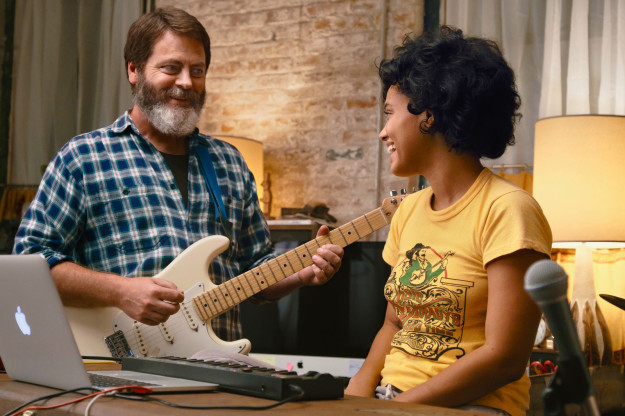
For those who got to know Nick Offerman’s work through Parks and Recreation, you might be accustomed to seeing him as the stoic, stern, woodworking Ron Swanson — a man who makes fun of salads, hippies, and too much enthusiasm. In Hearts Beat Loud, Offerman plays a Brooklyn-dwelling musician and the most earnest, effervescent role I’ve ever seen him in. He’s the kind of man who squeals with joy in artisan coffee shops. And it’s wonderful.
Hearts Beats Loud follows a father (Offerman) and his daughter (Kiersey Clemons) as he tries to pressure her into starting a band with him the summer before she leaves for college across the country. It’s heartrendingly sweet, with several original songs I’m genuinely distressed I can’t own and play on repeat already. I need them right now. It also features something still relatively rare onscreen: a love story between two women of color (Clemons and Sasha Lane). It’s a movie that doesn’t explicitly plug into any massive political conversations right now, but that’s part of the joy of it: It gets all its juice from just telling a human story with a big ol’ heart. Speaking to others who caught the film at Sundance, I got the impression that it clung to their hearts just as it did to mine. — A.B.
Distribution: Gunpowder & Sky will distribute Hearts Beat Loud in North America, while Sony Pictures Worldwide will distribute internationally. No word on dates yet.
Courtesy of Sundance Institute

